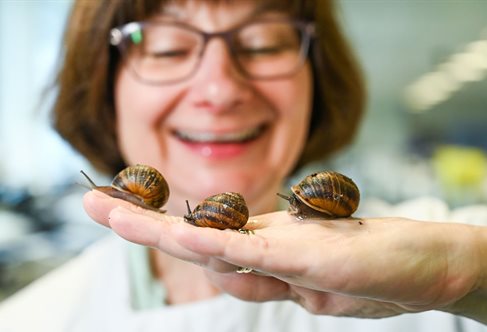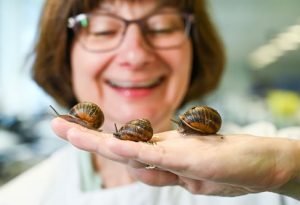Snail Slime May Lead to New CF Treatments Because of Its Antimicrobial Proteins
Written by |

Sarah Pitt and snails on her hand. Photo credits: University of Brighton
Small proteins with antimicrobial properties found in the mucus of the brown garden snail may open the door to the development of new treatments for patients with cystic fibrosis (CF) who often experience lung infections caused by the bacteria Pseudomonas aeruginosa, a study says.
The findings of the study, “Identification and characterisation of anti-Pseudomonas aeruginosa proteins in mucus of the brown garden snail, Cornu aspersum,” were published in the British Journal of Biomedical Science.
Antimicrobial resistance is a major public health concern that has led to a reduction in the use of antimicrobial agents to minimize the chances of new multi-drug resistant strains of pathogens. The emergence of these strains of P. aeruginosa — an opportunistic human pathogen that may cause respiratory tract infections, septicemia (blood poisoning), and wound and ear infections — are especially concerning.
“The bacterium is ubiquitous in the environment and pseudomonal infections are found in vertebrates, invertebrates and plants. Therefore, the strategies different organisms employ for defense against P. aeruginosa might be a source of naturally occurring antimicrobial agents, which could be used in human medicine,” the investigators wrote.
A group of researchers in a previous study found that the mucus of the brown garden snail (Cornu aspersum) somehow prevented the growth of different lab strains of P. aeruginosa. The team was led by Sarah Pitt, PhD, principal lecturer in the School of Pharmacy and Biomolecular Sciences at the University of Brighton.
In this new study, Pitt collaborated with researchers from King’s College London to test whether these antimicrobial properties of snail mucus would be clinically useful to fight strains of P. aeruginosa causing lung infections in CF patients.
“Pseudomonas aeruginosa is a very important cause of lung infections in patients with CF and strains which are resistant to the most commonly used antibiotic treatments are becoming increasingly common. Therefore a new antibiotic would be useful,” Pitt said in a news release.
The investigators extracted mucus from snails living in the wild, and performed a technique called size exclusion chromatography to purify it and obtain fractions containing mucus proteins of different sizes. Then, they assessed the antimicrobial activity of each fraction in different lab strains of P. aeruginosa, and in bacteria samples obtained from CF patients.
Results showed that the mucus strongly inhibited the growth of all P. aeruginosa lab strains, as well as that from bacteria isolated from CF patients. Fractions containing the smallest proteins found in the snail mucus also had the same antimicrobial properties.
“If we can make the proteins artificially in the lab, we can try and work out what they are doing to the bacterium. We think that it might be possible to incorporate the purified protein into a cream to treat deep burn wounds, and possibly an aerosol to treat lung infections,” Pitt said.
Further analyses allowed the researchers to identify four new snail proteins, including three that appear to have a strong activity against P. aeruginosa.
“Although four novel proteins have been identified here, the [largest] 37.4 kDa protein, to be named Aspernin, appears to be the most significant finding and it could be exploited to develop an antimicrobial substance for use in human medicine,” the researchers wrote.
“Because C. aspersum is farmed commercially in several countries, it is already possible to source large numbers of snails at low cost. Therefore, unlike many naturally-derived pharmaceutical compounds, sourcing the raw material would not be a problem and the antimicrobial components might be separated out when the snails are processed for other purposes,” they added.







